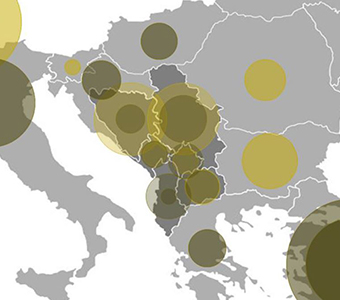Today we’ve published a new report analysing future energy trends in countries of the western Balkans.
From a robust dataset we researched together with the University of Groningen and the consultancy ‘The Advisory House’, we’ve pulled out a couple of illustrations.
The first looks at what the energy mix might look like in Albania, Bosnia and Herzegovina, Kosovo, Macedonia, Montenegro and Serbia, depending on how they move forward projects from their national energy strategies.
These figures include the annual output of those plants that are expected to be in operation in 2024. (For a more in-depth view of some of these projects, have a look at our country profiles.)
The next chart then looks at those same projects operating in 2024 and whether a particular country will be a net importer or exporter. The results show that nearly across the board, irrespective of the demand scenario (be it high, medium or low), Balkan countries will have excessive amounts of electricity and a number of plants that run the risk of not being used efficiently.
Among other conclusions that can be drawn from the study are that if Western Balkan countries improved their planning in the energy sector and placed more emphasis on energy efficiency and cross-border co-operation, a much smaller amount of investments would be needed without sacrificing supply stability.
Never miss an update
We expose the risks of international public finance and bring critical updates from the ground – straight to your inbox.
Theme: Energy & climate | Social & economic impacts
Location: Albania | Bosnia and Herzegovina | Macedonia | Montenegro | Serbia | Kosovo
Project: Banovici lignite power plant, Bosnia and Herzegovina | Kolubara B lignite-fired power plant, Serbia | Kosova e Re lignite power plant, Kosovo | Kostolac lignite power plant, Serbia | Pljevlja II lignite power plant, Montenegro | Stanari lignite power plant, Bosnia and Herzegovina | Tuzla 7 lignite power plant, Bosnia and Herzegovina | Ugljevik III lignite power plant, Bosnia and Herzegovina
Tags: Balkans | coal | data | energy | energy exports | infographic | stranded assets | study

